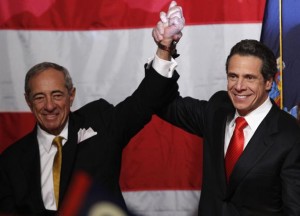His Father’s Son
By Gretchen Gibbs
The news that Andrew Cuomo blocked the work of his own investigation committee made me long for Mario, and wonder what their relationship is like. Looks like Andrew learned the political savvy and the ambition without the integrity. Not a new perception on my part, but this latest revelation sharpens it.
It made me ponder the relationship between my own father and my grandfather. My father learned many things from his father, like gentleness with children and the love of clocks, but a lot of his personality was formed in reaction to his father, who was blind.
Daddy was a visual type who loved to read and knew the world through his mind. His father, as a young man, loved to read as well, but while in law school he developed cataracts. A quack of a doctor removed them too early, and left him blind for life.
Grandpa liked to place me on his lap, facing away from him, and I would demand to play horsey. Horsey involved him jouncing me up and down while he recited:
“When I was a little boy, I lived by myself. All the bread and cheese I had I kept upon the shelf. The rats and the mice, they led me such a life, I had to go to Londontown to buy me a wife. The streets were so broad and the lanes were so narrow, I had to bring my wife home in the wheelbarrow. The wheelbarrow broke (here I go slipping through Grandpa’s knees), my wife had a fall (I slip through again) and down went the wheelbarrow, wife and all. ” (Here I am on the floor, laughing in delight.)
Every night Grandpa wound the clock, the one on my mantle now. It’s not valuable, purchased from Sears, I think, but I always regarded it with a kind of reverence because he did. I have two of my father’s clocks as well
Grandpa’s was a 24-hour clock, and every evening around six, he would approach the mantle, feel for it, feel for the latch that opened it, feel for the keys kept inside it, and then wind both the time-keeping apparatus and the chimes. All day, he counted the chimes so that he knew the time.
I asked Daddy about his father’s blindness several times and he couldn’t talk about it. I overheard a conversation between him and my mother, and the word he used was “shame.” To be sure, Grandpa had to give up law, and go into piano tuning, one of the few kinds of work that didn’t require vision.
Once, when I asked him about his childhood, Daddy said, “We were poor,” as though that said it all. Daddy had to put himself through college and graduate school with scholarships and work, while he and Mother raised us children. I was in third grade by the time Daddy got his Ph.D. He had considered law school, but decided he would do better teaching political science, which he did for most of his life at Boston University. He was ambitious and competitive, and his memoir is mostly full of details about his work successes. He became a dean and led a faction in opposition to the president of the university, John Silber.
In the conversation I overheard, Mother protested, “There was nothing to be ashamed of. It wasn’t his fault.” My father stated that in those days blindness was shameful. He could never bring anybody home from school. His mother never had friends over. They didn’t go out.
I wonder how Grandpa thought of his life, whether it felt shameful to him. I had a psychology professor who spoke of vision as the last of our senses to develop, and thought our other senses were more basic. Animals tend to have poorer vision as compared to ours, and to rely more on smell and hearing. Grandpa was forced into a more primitive kind of life. As I get older, have retired, and spend a lot of time alone, I can perhaps understand what it was like. I still use my eyes a great deal, but I find the simple pleasures of a summer breeze, the taste of ice cream, and my cat’s soft fur move me more than they used to. Grandpa loved his classical records, the radio, his root beer floats, playing with his grandchildren, his clock, and his pipe. His wife was always young and beautiful in his mind.
There’s really not much connection between the Cuomos, father and son, and my father and grandfather. My father reacted to his father’s inability to make money by trying hard for success. Andrew seems to have reacted to his father’s integrity by becoming self-serving. In my family, my grandfather was blind, my father ambitious. In the Cuomos, Andrew is the one who is blind, with ambition.
Tags: Andrew Cuomo, Gretchen Gibbs, Mario Cuomo

August 8th, 2014 at 7:02 am
Gretchen, thank you for this tender, poignant portrait of your grandfather, his delight in you and yours in him; the reflection on fathers and sons, your own dad.. The love of clocks and the shame of an affliction remind me of the book, “Tinkers,” by Paul Harding.